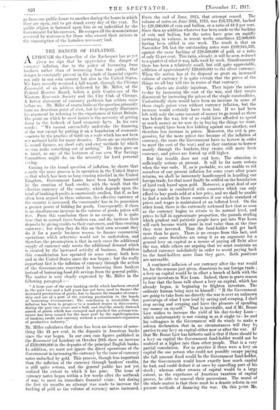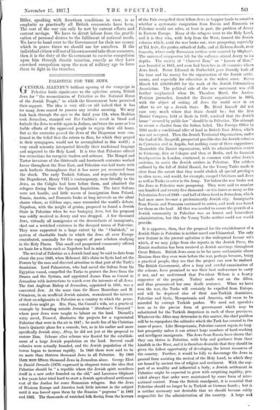THE ])ANGER OF INFLATION.
LTHOUGH the Chancellor of the Exchequer has as yet given no sign that he appreciates the danger of currency inflation, due to the policy of borrowing from bankers rather than of borrowing from the public, that danger is constantly present in the minds of financial experts not only in our own country but also in the United States. We have recently received a full report, through the Chicago Eeonomist, of an address delivered by Mr. Miller, of the Federal Reserve Board, before a joint Conference of the Western Eco, omic Society and the City Club of Chicago. A better statement of currency problems has seldom come before us. Mr. Miller of course looks at the question primarily from an American point of view, but he frequently illustrates his argument by referring to the experiences of Great Britain. The point on which he most insists is the necessity of getting down to the bedrock of hard economic facts. In his own words : " We cannot successfully undertake the financing of the war except by putting it on a foundation of economic concrete by the practice of thrift on a scale which has not been o :r national habit for many decades. There are no mysteries is sound finance, no short cuts and easy methods by which we can make something out of nothing." He then goes on insist, as any of the lecturers of our own War Savings Committees might do, on the necessity for hard personal swing.
Coming to the broad question of inflation, he shows that exactly the same process is in operation in the United States is that which has been so long causing mischief in the United Kingdom. Government Loans have been largely financed by the creation of bank credits, with the result that the effective currency of the country, which depends upon the total of banking deposits, is enormously swollen. But if, as has often been argued in these columns, the effective currency of the country is increased, the community has in its possession a greater power of bidding for goods. Consequently, if there is no simultaneous increase in the volume of goods, prices will rise. From this conclusion there is no escape. It is quite true that in normal times bankers can, and do, increase their deposits by giving credits to their customers, and thus creating currency ; but when they do this on their own account they do it for a purely business reason, to finance commercial operations which otherwise would not be undertaken, and therefore the presumption is that in suck cases the additional supply of currency only meets the additional demand which is created by the increased activity of business. Doubtless this consideration has operated to some extent both here and in the United States since the war began ; but the really important fact is the inflation of currency through the action of the Governments concerned in borrowing from bankers instead of borrowing bond-fide savings from the general public. The matter is very clearly expressed by Mr. Miller in the following paragraph :— " A large part of the now banking credit which has been created in the past two and a half years has not been used to finance the increased production of goods, but to finance the transfer of owner- ship and use of a port of the existing production to the hands of borrowing Governments. The conclusion is irresistible that inflation has boon in progress to a marked degree in this country during the pest two years and a half, and that the steady forward march of prices which has cramped and pinched tho average con- sumer has boon caused for the most part by the rapid expansion of banking credit and currency without a commensurate expansion of productive industry."
Mr. Miller calculates that there has been an increase of some- thing like 45 per cent. in the deposits in American banks since the war began. In our own case figures published in the Economist (of London) on October 20th show an increase of £320,000,000 in the deposits of the principal English banks. In addition, we must not ignore the direct operations of the Government in increasing the currency by the issue of currency notes unbacked by gold. This process, though less important titan the inflation of the currency through bankers' credits, is still quite serious, and the general public has not yet realized the extent to which it has gone. The issue of currency notes began within a few weeks after the outbreak of war, to meet an immediate financial crisis ; but during the first six months an attempt was made to increase the backing of gold as the volume of currency notes increased.
From the end of June, 1915, that attempt ceased. The volume of notes on June 30th, 1915, was £46,576,801, backed by £28,500,000 of coin and bullion, or a ratio of 61.3 per cent. Since then no addition whatever has been made to the backing of coin and bullion, but the notes have gone on rapidly increasing in volume, in recent weeks sometimes £2,000,000 having been added in one week. The result is that on November 7th last the outstanding notes were £189,944,339, against the same backing of £28,500,000 of gold, or a ratio of only 15 per cent. This ratio, already, it will be seen, reduced to a quarter of what it was, falls week by week. Simultaneously there has been a relatively small, but still quite appreciable, addition of approximately £20,000,000 to the silver currency. When the nation has at its disposal so great an increased volume of currency it is quite certain that the prices of the things we all buy will rise in terms of that currency.
The effects are doubly injurious. They injure the nation to-day by increasing the cost of the war, and they create discontent by increasing the prices of the staple commodities. Undoubtedly there would have been an increase in some of these staple prices even without currency inflation, but tho increase would certainly have been less. If we had been left with only the same amount of money to go round as there was before the war, few of us could have afforded to spend as much money as we now do in buying the things we want. There would have been less bidding against one another, and therefore less increase in prices. Moreover, the evil is pro- gressive, for the more prices rise because of the inflation of currency, the more the Government have to borrow in order to meet the cost of the war; and as they continue to borrow mainly through the bankers, they create still more fresh currency, and prices are forced up still higher.
But the trouble does not end here. The situation is sufficiently serious at present. It will be far snore serious when the war ends. If, as is probable, we are unable to rid ourselves of our present inflation for some years after peace returns, we shall be immensely handicapped in handling our foreign trade, for that must finally be settled on the foundation of hard cash based upon gold. Moreover, a great deal of our foreign trade is conducted with countries which can only afford to buy goods sold at a low price, and we shall be unable to find a market in those countries if our whole standard of prices and wages is maintained at an inflated level. On the other hand, there is the extremely awkward fact that as soon as the currency begins to return to its normal level, and prices to'fall in approximate proportion, the pounds sterling which prudent and patriotic people have put into War Loan will each become worth more in real value than at the time they were invested. Thus the fund-holder will get back more than he gave. There is no escape from this fact, and already some Socialists are using it as an argument for a general levy on capital as a means of paying off Debt after the war, while others are arguing that we must maintain an inflated currency indefinitely in order to avoid paying back to the fund-holders more than they gave. Both positions are untenable.
A continued inflation of our currency after the war would be, for the reasons just given, disastrous to our foreign trade ; a levy on capital would be in effect a breach of faith with the present investors in War Loan. Indeed, there is grave reason to fear that the loose talk about a levy on capital, which has already begun, is beginning to frighten investors. The ordinary human being says to himself : " If the Government are going to take from me directly the war is over an unknown percentage of what I now lend by saving and scraping, I shall stop saving and scraping and have the pleasure of spending my money on myself." That is inevitable, and if Mr. Boner Law wishes to increase the yield of his day-to-day Loan— which unfortunately is not coming in as it ought to—he and his colleagues in the Government will do wisely to make a solemn declaration that in no circumstances will they b.„. parties to any levy on capital either now or after the war. Alt that Mr. Bonar Law has hitherto said is that if there should be a levy on capital the Government fund-holder would not bo mulcted at a higher rate than other people. That is a very partial consolation. For in practice if there were a levy on capital the one person who could not possibly escape paying the full amount fixed would be the Government fund-holder, for the Government would know exactly how much capital he had, and could deduct it at once by cancelling part of his stock ; whereas other owners of capital would to a largo extent, as the experience of American taxation of capital proves, be able to conceal their possessions. The moral of the whole matter is that there must be a drastic reform in our present methods of financing the war. On this point Mr.
Miller, speaking with American conditions in view, is as emphatic as practically all British economists have been. The cost of the war can only be met by current efforts and current savings. We have to divert labour from the gratifi- cation of personal desires to the fulfilment of national needs. We have to hand over to the Government for their use money which in peace times we should use for ourselves. If the individual citizen will not of his own accord take these measures, then it is the duty of the Government to exercise compulsion upon him through drastic taxation, exactly as they have exercised compulsion upon the men of military age to force them to fight in the trenches.















































 Previous page
Previous page